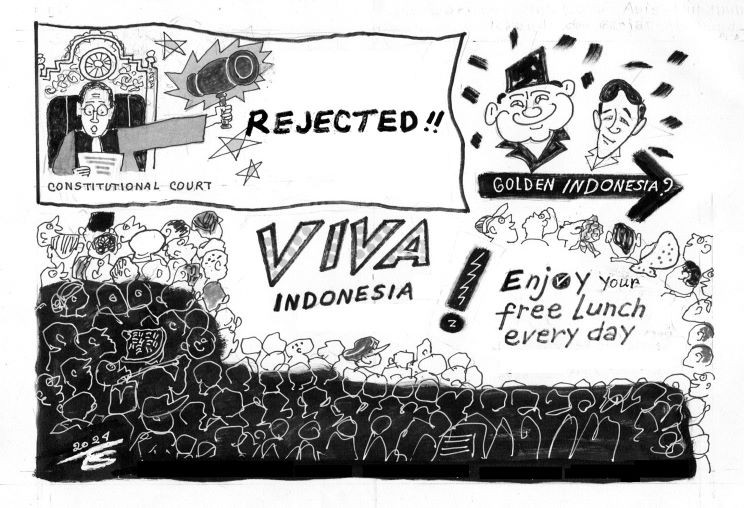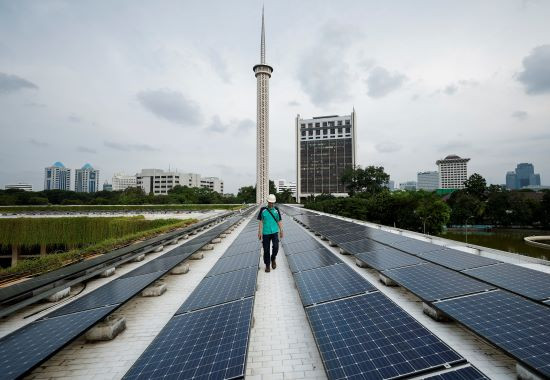Who owns Fintech?
The worst-case scenario is that regulators have completely conflicting visions on where to take the industry and actively issue regulations that undermine one another’s authority over the industry, subsequently hampering innovation.
Change Size
 Illustration of fin-tech. (Shutterstock/File)
Illustration of fin-tech. (Shutterstock/File)
A
lmost a year after initiating discussions on regulating the fintech industry, the Financial Services Authority (OJK) finally produced some concrete rules by issuing a draft regulation on fintech lending.
Although narrow in scope, the draft does apply a principled approach to consumer protection by putting forth stringent requirements for fintech lenders to obtain licenses and fully operate in Indonesia.
Requirements such as a minimum of Rp 2 billion in paid-up capital to become a registered fintech company under the OJK and Rp 5 billion in paid-up capital to obtain a license are aimed at screening out unscrupulous players from taking advantage of the lucrative fintech lending market.
(Read also: ANALYSIS; Peer-to-peer lending: A new form of financial inclusion)
However, initially aiming to regulate all fintech subsectors, from payments to crowd funding, wealth management and remittances, the draft regulation exhibits a significantly limited jurisdiction compared to its earlier premise.
Two weeks prior to the OJK’s issuance of the draft regulation, Bank Indonesia published BI Regulation No. 18/40/PBI/2016 on Payment System Processing in conjunction with the launch of its Fintech Office.
According to BI Governor Agus Martowardojo, the Fintech Office’s objective is to facilitate innovation of all digital technology-based financial service providers, become a national point of contact for all fintech companies and subsequently provide business intelligence, then assess, coordinate and communicate between the relevant government and private sector entities.
Most importantly, it provides fintech players with a regulatory sandbox that allows fintech startups to try, fail and succeed within certain parameters set by Bank Indonesia.
On the other hand, Article 12 of the draft OJK regulation on fintech lenders requires a “fintech lender to continuously increase its practical knowledge through the OJK’s fintech hub”. Based on an OJK press release from Oct. 6, the fintech hub is designed to be the one-stop national point of contact for all fintech companies to communicate, collaborate and cooperate with institutions that play a supporting role in the digital financial ecosystem.
The fintech hub provides minimum regulations as a legal basis for the fintech sector to attract investment, protect consumers and grow sustainably.
Now, it may seem odd that two institutions that are supposedly established to complement one another in regulating the financial sector would come up with competing divisions to serve a similar function.
But that, unfortunately, is the current state of our regulatory environment.
Alas, this is the challenge that needs to be dealt with when multiple entities supervise the financial sector, unlike our neighboring countries Malaysia and Singapore.
The byproduct of multiple regulators, particularly related to fintech, is a very fragmented approach to regulating the industry. BI, the OJK and to some extent the Communications and Information Ministry and the Creative Economy Agency (Bekraf) all have their own ideas on how fintech should contribute to the growth of Indonesia’s economy.
This leads to an impression that fintech can be regulated in very particular segments rather than holistically. The discordance between all these relevant institutions is already evident in the allowance of foreign ownership in each regulation relevant to the digital economy that they’ve championed.
E-commerce, for example, allows for 100 percent foreign ownership, if the valuation is above Rp 100 billion. This stipulation was spearheaded by the Communications and Information Ministry and included in the Negative Investment List. Fintech lenders, according to OJK rules, are allowed to have 85 percent foreign ownership. Payment system providers, led by BI, are only allowed 20 percent foreign ownership.
Although it may seem harmless now, the fragmented supervision of fintech is a reflection of the general lack of coordination between government institutions in policymaking, and the institutional tension that already exists between Bank Indonesia and the OJK in particular. This reflects in their quest to compete for ultimate “ownership” over the fintech sector.
Add to this the backdrop of the upcoming revisions to Law No. 23/1999 on Bank Indonesia and Law No. 21/2011 on the OJK, and the institutional tension will reach its apex in the upcoming sitting session of the House of Representatives slated to begin on Jan. 10.
So what does that mean for a burgeoning industry with a huge potential market in Indonesia? The bestcase scenario would be a limited administrative impact, where the overlapping licensing process might cause fintech businesses to incur delays in obtaining licenses but nothing detrimental.
The worst-case scenario is that regulators have completely conflicting visions on where to take the industry and actively issue regulations that undermine one another’s authority over the industry, subsequently hampering innovation. Thus, unless one regulator comes out and “owns” the industry, there’s a real fear that the latter may become inevitable.
But for the sake of the industry, I sincerely hope I’m proven wrong.
---------------
We are looking for information, opinions, and in-depth analysis from experts or scholars in a variety of fields. We choose articles based on facts or opinions about general news, as well as quality analysis and commentary about Indonesia or international events. Send your piece to community@jakpost.com. For more information click here.









